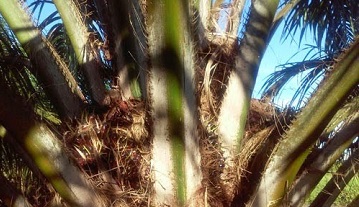Students of IPB Initiated Anti Dental Caries Product of the Midrib of Palm

The use of xylitol as a tooth-firendly sugar was one of the solutions in maintaining and taking care of the dental health. Xylitol was known as a natural sweetener which sweetness level was equivalent to sucrose. The innovation initiated by five students of Faculty of Agricultural Technology (Fateta), Bogor Agricultural University (IPB), became the solution for handling the oil palm leaf midrib waste which amount was very much.
According to Directorate General of Plantation in 2014 that in the recent years the area of the oil palm plantation in Indonesia continued to increase from 8,385,394 hectares in 2010 to be 10,465,020 hectares. Increasing the area of the oil palm plantation demanded the development of the oil palm derivative product innovation that was increasingly high. The development of the oil palm also had a positive impact on the economic growth indicated by the development of the investment, the output and the foreign exchange. However, the increase in the area of the land also resulted in the increasing number of the palm oil leaf midrib waste that was wasted.
“With the emergence of the innovative utilization of the palm midrib petiol for producing the xylitol as the anti dental caries can overcome the waste problems that occur in the oil palm plantation,” said Hikam Waakito Adi, the innovative xylitol idea maker from the palm midrib petiol.
Hikam said, through this innovative would produce a product of sugar friendly (anti caries) teeth and also environmentally friendly, because it could reduce the existing waste of the palm oil midrib. “Xylitol is very suitable consumed by the patient with diabetes mellitus, because it has a low glycemic index,” he said.
He also explained, the awareness to maintain the teeth in Indonesia had a positive trend, the community was already aware of the dental health. Given the importance of the dental health, since it needed to do the dental health care to avoid the interference or infection of the teeth. The type of the disease that generally infected the teeth was caries. The caries was a demineralization process caused by the interaction between the microorganism, the saliva, the tooth enamel and the lagged parts. Then it would be followed by the hard tissue damage to the teeth, then there was the damage to the organic material.
According to the research of the use of the xylitol as much as 5-10 grams per day could reduce the caries risk by 82 percent. However, so far the need of the xylitol in Indonesia was supplied from importing in other countries such as United States of America, China, India, Japan and the countries in Europe. It proved that the need of the xylitol in Indonesia was quite high. The palm midrib petiol could be made the alternative, becasue it contained the protein, fat and hemicellulose nutrients. The hemicellulose which was abundance and the amount of the palm midrib petiol waste made it potential to process to become the xylitol through the hydrolysis and fermentation processes.
Hikam reveleaed if in this research would be proven to be able to produce the xylitol, this information could become the rationale for making the xylitol as a tooth-friendly sugar, and would also be able to reduce the amount of the palm midrib pentiol waste, as well as produced the high value products.(AT/NM)



